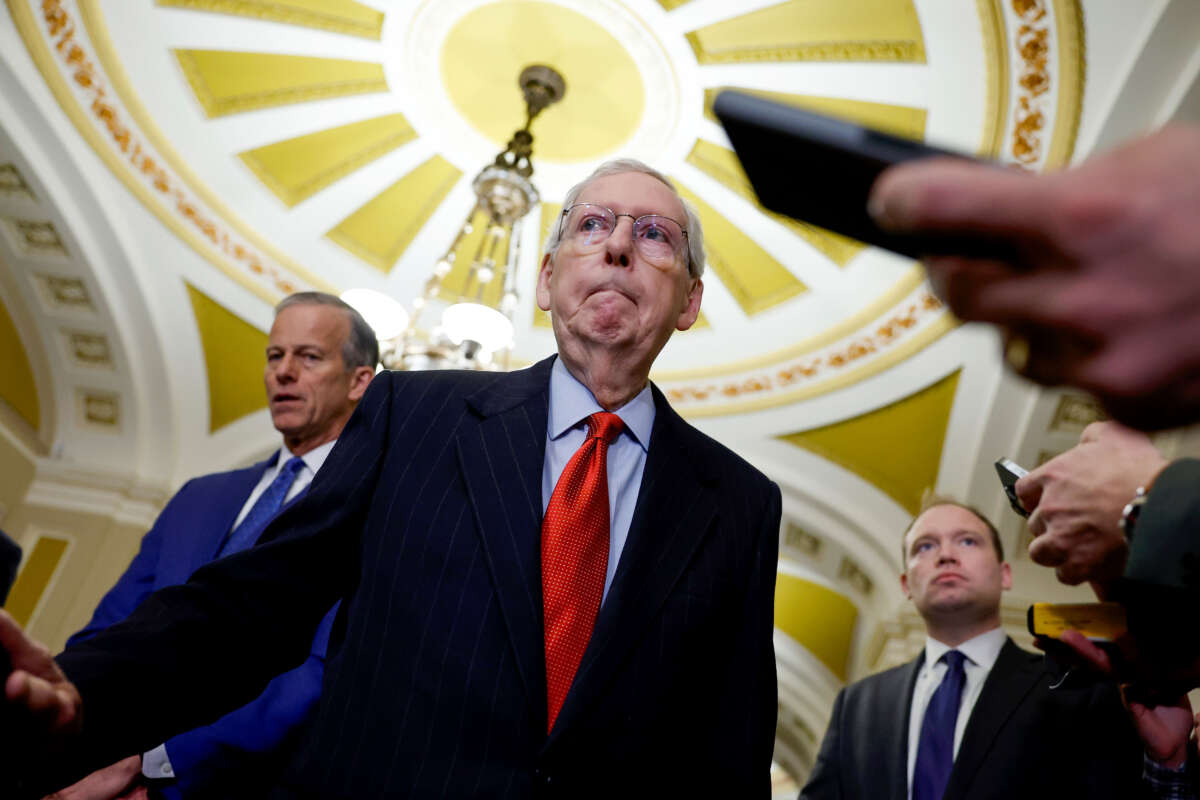Support justice-driven, accurate and transparent news — make a quick donation to Truthout today!
On Wednesday afternoon, Republican Senate Minority Leader Mitch McConnell, who has represented the state of Kentucky in the upper house of Congress since 1984, announced his plans to step down as leader of the GOP conference by the end of this year.
McConnell, 82 years old, is the longest-serving Senate Republican leader, having assumed the role in 2007 — nearly two decades and three presidential administrations ago. His planned retirement is perhaps unsurprising, as he has been plagued by numerous health issues in recent years, including multiple instances where he seemed unable to speak after reporters asked him questions during press briefings.
Aides to McConnell insisted the decision to step aside is unrelated to health concerns.
In a speech on the Senate floor, McConnell indicated that he would wait until November before stepping down from the position of GOP leader. He will remain in his Senate seat until the end of his term, which expires in January 2027.
“This will be my last term as Republican leader of the Senate,” McConnell said in his speech. “I’m not going anywhere anytime soon. I will complete my job my colleagues have given me until I complete my term in November.”
McConnell’s legacy will likely not secure him anything resembling a “profiles in courage” acknowledgment — indeed, at many times in his career, the Bluegrass State lawmaker was open about his desire to “win” politically rather than work toward compromise with his colleagues of differing views, taking pride in his role as an oppositional figure to former President Barack Obama during his tenure in office.
Most infamously, McConnell sought to stack the federal judiciary with far right nominees, including by advancing choices that the American Bar Association said weren’t qualified to serve. McConnell was incredibly shrewd in his attempts to ensure that the judiciary would remain reflective of his staunch conservative views. He led the crusade to block Merrick Garland, then a respected federal judge, as Obama’s final Supreme Court nominee in 2016, citing the unprecedented reasoning that it would be uncouth to appoint a new justice during a presidential election year. Yet when the same situation came about in 2020 following the passing of Justice Ruth Bader Ginsburg, McConnell fast-tracked the process to ensure that former President Donald Trump could have three appointments to the Supreme Court.
It’s widely recognized that, by blocking Obama’s Supreme Court appointment and fast-tracking Trump’s last one, McConnell’s efforts led to the overturn of Roe v. Wade, the precedential case from 1973 that established federal abortion rights protections, long a goal of conservative politicians since its inception.
McConnell’s legacy will also be tainted by his relationship with Trump, which was recognizably cold at various points during and after his presidency. Despite his dislike for the corporate businessman-turned-president, however, McConnell rarely took it upon himself to hold Trump to account, voting to keep him in the White House in both of his impeachment trials, including following the January 6, 2021, attack on the Capitol, which McConnell recognized Trump was responsible for instigating. McConnell has also been quiet on whether he backs the former president’s run for the White House as the GOP nominee for a third straight election cycle.
McConnell “purposefully undermined America’s first Black president, he broke the Supreme Court, he helped elect a fascist President, and he abetted up an insurrection on American soil,” said Shannon Watts, a political commentator and co-founder of the gun reform group Everytown.
“In terms of impact, nothing quite compares to his extraordinary move in 2016 to prevent Obama from filling a Supreme Court seat for nearly a year, and then building the most conservative Court in about a century under Trump,” NBC News senior national political reporter Sahil Kapur wrote on X.
“Mitch McConnell is not a hero or a good person,” said political pundit Victor Shi. “He’s the reason why Roe fell. He’s a big part of the reason why the Republican Party is where it is today. … He had the opportunity to vote Trump guilty in the Senate. He could’ve stood up to Trump numerous times during his presidency and truly hold him accountable. But he didn’t. And that’s why we are where we are right now.”
Press freedom is under attack
As Trump cracks down on political speech, independent media is increasingly necessary.
Truthout produces reporting you won’t see in the mainstream: journalism from the frontlines of global conflict, interviews with grassroots movement leaders, high-quality legal analysis and more.
Our work is possible thanks to reader support. Help Truthout catalyze change and social justice — make a tax-deductible monthly or one-time donation today.
